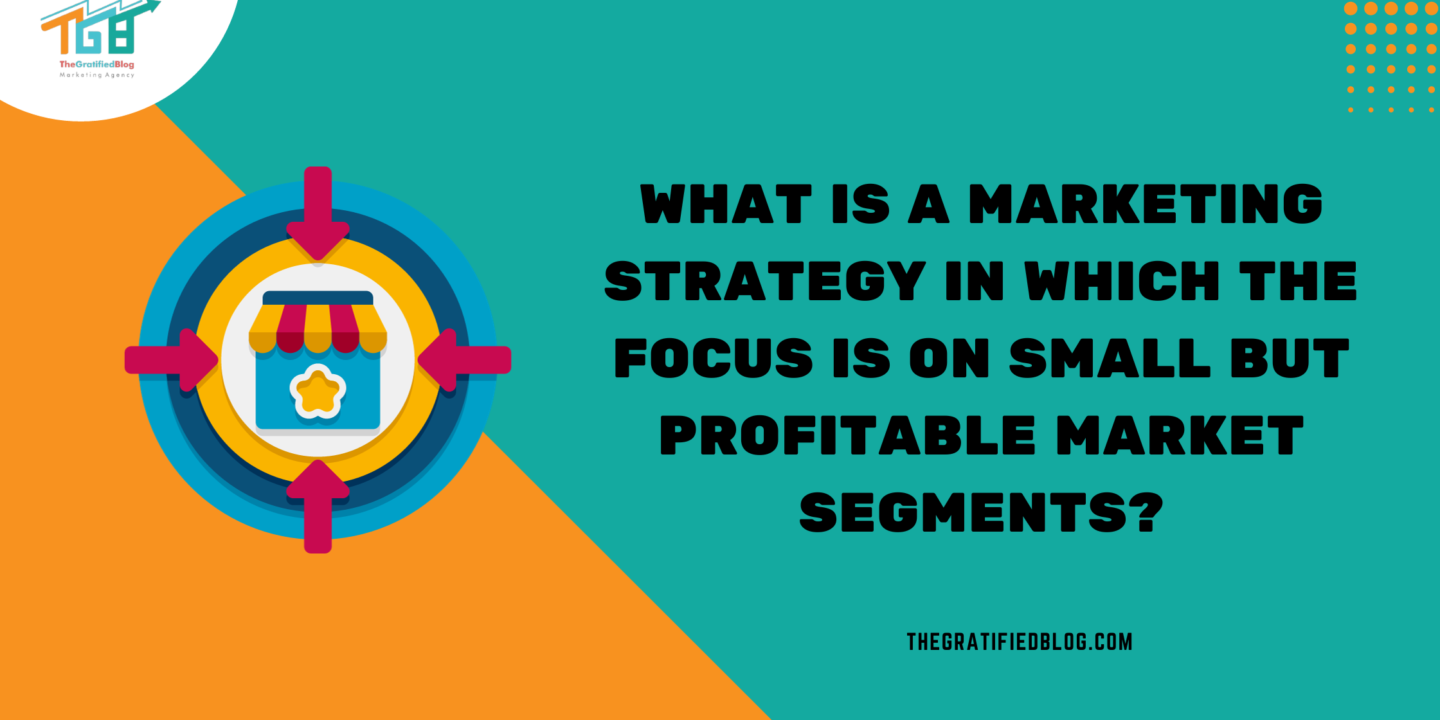
In dynamic marketing, success often hinges on finding the perfect balance between casting a wide net and zooming in on precise targets. Today, we venture into the fascinating realm of marketing strategies, delving into a question that’s increasingly gaining prominence: What is a marketing strategy focusing on small but profitable market segments? The solution to this question is the gateway to unleashing a realm of possibilities where businesses can thrive by honing in on niche audiences, delivering tailored solutions, and reaping the rewards of deep customer engagement.
In this blog, we’ll embark on an exploratory journey to unravel the concept of niche marketing, understand why it works, and uncover the strategies that enable businesses to succeed by focusing on small yet lucrative market segments. So, fasten your seatbelts and dive into the exciting world of niche marketing.
So, let’s get started. But first, let’s answer the question.
What Is A Marketing Strategy In Which The Focus Is On Small But Profitable Market Segments?
- Niche Marketing
- Mass Marketing
- Broad Marketing
- Target Marketing
Correct Answer: A) Niche Marketing
Now that we’ve identified the correct answer let’s look at the concept it represents: Niche Marketing.
What Is Niche Marketing?
Niche marketing is a strategy designed to trim specialized and well-defined market segments. This segment shares specific characteristics, needs, and interests, making it distinct from the broader market.
The core aim of niche marketing is to cater to the unique requirements of this select group of consumers, providing them with products or services tailored precisely to their preferences.
This strategy contrasts mass marketing, where businesses cast a wide net to reach the entire market. Niche marketing, on the other hand, zooms in on a particular subset of the market, often referred to as a “niche.” These niches can vary widely, encompassing everything from dietary preferences and hobbies to demographics and geographical locations.
Why Does Niche Marketing Work?
Niche marketing has gained popularity for several reasons:
- Focused Targeting: Niche marketing allows businesses to concentrate their marketing efforts on a specific set of consumers. By identifying a well-defined niche within the market, companies can deliver messaging that is not just personalized but also highly relevant to the needs and desires of this particular audience. This precision in targeting significantly enhances the chances of resonating with the audience, creating a profound impact.
- Reduced Competition: In the domain of niche marketing, competition is notably lower compared to broader markets. This diminished level of competition affords businesses a unique opportunity to position themselves as authorities and leaders within the chosen niche. With fewer players vying for the same audience’s attention, it becomes easier to stand out, build brand authority, and capture a significant market share.
- Higher Profit Margins: Niche products or services are prized for their ability to meet the distinctive needs and preferences of the target audience. As a result, they often command premium prices, attracting consumers willing to pay more for a specialized solution that perfectly aligns with their requirements. These premium prices translate into substantially higher profit margins, even with a smaller customer base.
- Customer Loyalty: Successfully catering to a niche audience establishes the foundation for nurturing a loyal customer base. This unique audience deeply appreciates the personalized attention and specialized offerings explicitly tailored to their needs. The result is a robust and enduring relationship with customers who continue to engage with the business and become advocates, generating positive word-of-mouth marketing and expanding the brand’s reach.
- Lower Marketing Costs: Niche marketing is an inherently cost-effective strategy. This efficiency arises from deliberately targeting a well-defined audience, sparing businesses from wasting resources on reaching a broad and uninterested public. Instead, all marketing efforts are laser-focused on getting those most likely to convert, optimizing resource use, and increasing the overall return on investment.
Having gained an understanding of niche marketing and its effectiveness, exploring the advantages and obstacles associated with this strategic approach is essential.
Benefits And Challenges Of Niche Marketing
Benefits Of Niche Marketing
Niche marketing offers numerous advantages for businesses willing to embrace this strategy. Here are some of the key benefits:
- Reduced Competition: One of the most compelling advantages of niche marketing is the notable reduction in competition. When you focus on a smaller, specialized market segment, the likelihood of encountering many competitors significantly diminishes. This aspect makes establishing your brand as a prominent and influential figure in the niche more straightforward.
- Increased Customer Loyalty: Niche customers tend to exhibit higher levels of loyalty. They are less inclined to explore alternatives when finding a business catering to their needs. Cultivating enduring relationships with a loyal customer base represents a profound advantage, as it can lead to sustained profitability over time.
- Better ROI (Return on Investment): By directing your marketing efforts toward a small yet lucrative market segment, you stand to achieve a superior return on investment (ROI). This heightened efficiency in spending is a direct result of your marketing resources being allocated to individuals who are most likely to convert. In essence, your marketing expenditures are streamlined, leading to a more streamlined and effective distribution of resources.
- Improved Product Development: Concentrating on a niche market empowers you to finely calibrate your products or services to conform with the specific requirements of this audience. This in-depth understanding allows you to develop highly specialized, top-quality offerings that attract and retain customers, enhancing your business’s overall appeal.
- Brand Authority: Niche marketing is a potent tool for establishing your brand as an authoritative figure in a specific domain. As your business becomes synonymous with expertise within the chosen niche, trust and credibility burgeon among your target audience. The perception of your brand as a trusted source within the niche can be a powerful catalyst for growth and market dominance.
Challenges Of Niche Marketing
While niche marketing can be advantageous, it has its challenges. Here are some potential obstacles to consider:
- Limited Growth Potential: While niche marketing offers several advantages, it can sometimes have limited growth potential compared to broader markets. Businesses must assess whether their chosen niche can effectively sustain their growth objectives. Ensuring long-term viability is of paramount importance.
- Narrow Focus: A potential drawback of niche marketing is the risk of being overly narrowly focused. Concentrating your efforts on a specific niche may make your business vulnerable to economic downturns or other issues that affect that niche. It’s imperative to diversify or be prepared to adapt to changing circumstances.
- Marketing Costs: Targeting a niche audience may necessitate increased research and marketing customization efforts. This specialization, while beneficial, can sometimes result in higher marketing costs. Balancing the need for tailored marketing with cost efficiency is a challenge businesses often face.
- Competitive Threats: As your niche market grows and proves profitable, it can attract the attention of competitors looking to exploit the same segment. The challenge here is to stay ahead and retain your position as the go-to choice within the niche. This often requires ongoing innovation, service excellence, and strategic defensive moves to safeguard your market share.
Now that we’ve explored both the advantages and challenges inherent in niche marketing, let’s delve into the precise strategies for implementing this targeted approach effectively.
Implementing Niche Marketing Effectively
Niche marketing is a powerful strategy, but success hinges on effectively executing a well-planned approach. Here, we’ll take an in-depth look at the steps to implement niche marketing successfully. From meticulous market research to constant adaptation, each phase plays a pivotal role in ensuring the profitability and sustainability of your niche marketing strategy.
Here are the steps:
Comprehensive Market Research

The first crucial step in niche marketing is conducting thorough market research. This foundational phase involves identifying a niche with the potential for profitability. To do this, delve deep into market analysis, where you scrutinize consumer needs, preferences, and pain points within the niche.
This research serves as the bedrock upon which your entire strategy will rest. It enables you to comprehend the unique characteristics of your chosen audience and lays the groundwork for tailoring your offerings to meet their specific demands. Successful niche marketing begins with this meticulous understanding.
Precise Segmentation
Once you’ve pinpointed your niche, the next step involves further segmenting it. This process aims to uncover sub-niches or micro-niches within your initial niche. The goal is to refine your targeting to the most granular level possible, as this precision significantly heightens your chances of success.
Segmentation is the art of separating your niche audience into distinct groups with unique preferences and requirements. The more precise your segmentation, the better equipped you are to tailor your products, services, and marketing efforts to cater to each group’s specific needs.
Tailored Product Or Service Development

With a clear understanding of your niche audience and precise segmentation in place, the next step is to tailor your product or service to address the particular needs of the niche. That isn’t merely about customization; it’s about delivering quality and uniqueness that distinguishes your offerings within the niche market.
Niche customers are discerning and seek specialized solutions that genuinely resonate with them. Your product or service should meet and exceed their expectations, setting a new standard within the niche. Crafting offerings distinctly suited to your audience is a cornerstone of niche marketing success.
Pricing Strategy That Reflects Value
In niche marketing, pricing plays a pivotal role in your strategy. The niche audience often values your specialized solutions, which means they are willing to pay a premium for this value. Therefore, determining a pricing strategy that reflects your offer’s value is essential.
It’s not an exercise in setting the lowest price possible; it’s about pricing your product or service to demonstrate its worth within the niche. Remember that niche customers are often ready to pay more for a specialized solution that aligns perfectly with their needs. Finding the right pricing balance is critical to sustaining profitability in niche marketing.
Tailored Marketing And Promotion

Your marketing and promotional efforts bridge your specialized offerings and your niche audience. In this phase, the focus is on creating campaigns that speak directly to the niche audience. It means utilizing channels and messaging that resonates deeply with them.
Content marketing, social media, and influencer partnerships are highly effective in niche marketing. These avenues allow you to engage with your audience in a personalized and compelling way. The goal is to deliver messages that capture their attention and speak to their unique needs and preferences, creating a connection beyond the transactional.
Building Strong Customer Engagement

Building a solid and enduring relationship with your niche audience is fundamental to niche marketing success. That goes beyond the initial transaction and extends into personalized communication, feedback channels, and excellent customer service.
Engaging with your niche audience meaningfully and respectfully builds trust and loyalty. Niche customers appreciate your business’s specialized attention and care, which leads to repeat business and positive word-of-mouth marketing.
Continuous Monitoring And Adaptation

Niche marketing is not a static strategy; it’s an ever-evolving process that demands ongoing surveillance and adaptation. Market dynamics can change, consumer preferences may evolve, and new competitors may enter the niche. As such, it’s essential to stay vigilant and be ready to adapt your strategy accordingly.
Regularly assess the performance of your niche marketing efforts. Pay attention to changing market trends, consumer feedback, and emerging competitors. This adaptive approach ensures that your niche marketing strategy remains effective and your business thrives within the chosen niche.
Conclusion
Now that we’ve gained a comprehensive understanding of niche marketing, it’s time to consider the potential benefits it can offer. Investing in niche marketing today can lead to more favorable outcomes than mass marketing strategies.
If you still have any questions related to the blog, then feel free to leave your questions in the comment section. We will be delighted to respond to them.
Thanks for reading 🙂








No Comments